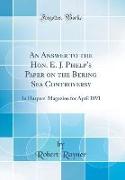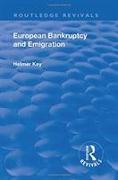An Answer to the Hon. E. J. Phelp's Paper on the Bering Sea Controversy
BücherAngebote / Angebote:
Excerpt from An Answer to the Hon. E. J. Phelp's Paper on the Bering Sea Controversy: In Harpers' Magazine for April 1891Not full: because it simply ignores, where it does not pervert, the most important geographical and documentary facts, and the most elementary legal axioms.Not clear: because it is wordy to tediousness, Often illogical, and sometimes faulty in construction and grammar.The Professor in his next sentence is quite as obscure and puzzling as Mr. Blaine at his worst. If in this position he Mr, Blaine is right, it is the end Of the case. Because it brings these waters, as against Great Britain at least, within the territorial jurisdiction Of the United States, not by Meir geo grafiln'cal situation alone but by the treaties (h. M. 7 This is an intima tion that there is something about the geographical conditions of Bering Sea which of itself would or should give us the jurisdiction over it. The situation of that sea is between shores belonging to two di¿'erent nations. In con figuration it is not separated from the Pacific Ocean by a barrier of land pierced only by channels narrow enough for defence from on shore, but this sea forms an integral part of said ocean, with which it is connected by numerous very wide channels through the chain of the Aleutian Islands, and west of these by an uninterrupted expanse of Open sea of more than 500 nauti cal miles in width. In situation and in configuration, then, Bering Sea does not possess those qualities which in international law are the conditions sine qua non of a closed sea, and which alone give a title to national jurisdiction over such waters. If Mr. Phelps knows of any other geographical character istles, even aside from situation, which have such an effect in law, he ought in fairness to enlighten an ignorant world by a full explanation, and not to slur over so important a matter with a mere implication. Mr. Blaine would be very thankful for such information, as it might ensure a diplomatic success. The want of this information has forced him to disavow fervently all thoughts of claiming Bering Sea as one closed from shore to shore, and to content himself with the make-shift of its partial closing, over a belt of one hundred, or even sixty miles only from the shores. If the old hard and fast rules, uniform for all nations, concerning closed seas, the freedom Of the seas, and the pursuit on these of wild animals, have been outgrown by the world, there ought to be substituted for these rules, new ones, somewhat on the plan of the old, sliding scale, establishing the precise territorial shore belts in conformity with the varying width Of channels between seas and oceans, the varying value of a nation's interest or property in the different kinds of wild animals, and the varying degree of domesticity or vagrancy of the differ ent kinds of such creatures. The successful working out of such a problem might not be less difficult than the squaring Of the circle, but it would proba bly have the same fascination for certain minds. It would be interesting to know whether this part of Mr. Blaine's argument recommends itself as much to the Professor as that part relating to the effects of the treaties, and if so, on what juristical grounds.About the PublisherForgotten Books publishes hundreds of thousands of rare and classic books. Find more at www.forgottenbooks.com
Folgt in ca. 10 Arbeitstagen

